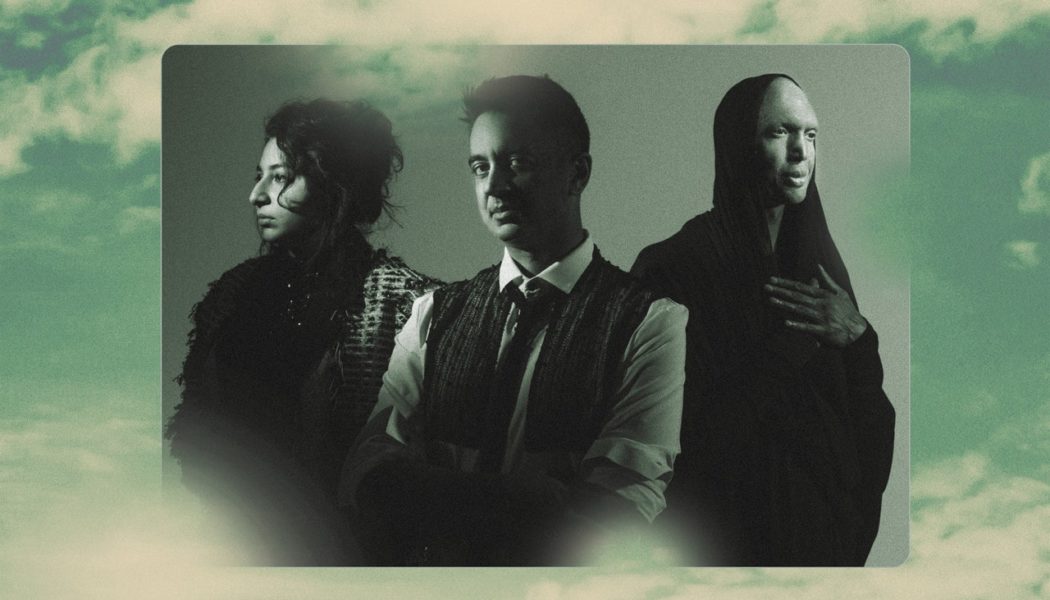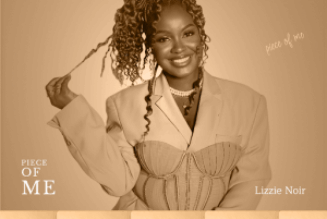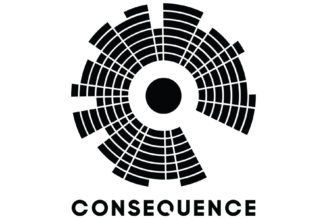Since 2015, Arooj Aftab has gradually distilled the essence of her work. On her debut album, Bird Under Water, the Pakistan-born, Brooklyn-based composer fused ghazal—a South Asian style focused on loss and love, both romantic and divine—with pop, jazz, and soul, finding the consonance between musical traditions from different corners of the world. On 2018’s ambient Siren Islands, she stripped away tradition, weaving her otherworldly voice between layers of synthesizer. By 2021’s Vulture Prince—her breakout record, an elegiac piece filigreed with voice, harp, and violin—she had learned to squeeze every drop of emotional resonance out of a single elongated syllable, or the vibrato of a gently pressed harp string.
Love in Exile—Aftab’s new album in collaboration with pianist and jazz composer Vijay Iyer and multi-instrumentalist Shahzad Ismaily—takes that process of distillation even further: coaxing an entire album’s worth of pathos out of a handful of Urdu couplets, crafting complex emotional inner worlds through the ritualistic repetition of just a few lines of poetry. In Ismaily and Iyer, she has found the perfect partners. All three draw from a shared vocabulary that is subtle, intricate, and minimalist, yet incredibly expressive.
Recorded live in a New York studio and released with minimal editing, the album’s six tracks retain the unhurried, conversational feel of improvisation, but without any of improv’s attendant looseness. Iyer’s intricate piano phrases and Ismaily’s pulsing bass and drones move in intuitive cycles, with textures and melodies slowly coalescing out of the interplay between their instruments. Aftab’s powerful voice fits seamlessly into these soundscapes, melancholy melismas languidly unfurling like ink dropped into water. At moments—when Iyer’s piano melody weaves serpentine shapes around Aftab’s voice on “Sajni,” or Ismaily’s sepulchral Moog synth shares space with Iyer’s delicate topline on “Eye of the Endless”—their connection seems telepathic, three seasoned musicians breathing together as a single organism.
This potent chemistry is on display from the opening moments. Synths shimmer like cosmic backwash at the outset of “To Remain/To Return,” occasionally interrupted by the portentous thump of a bass drone. Iyer begins with hesitant, stuttering notes, as if testing the waters, before finally settling into a sinuous piano phrase that loops and loops, subtly mutating as it repeats. Aftab joins three minutes in, her expansive voice slotting into the spaces left by the two instrumentalists. That first disconsolate “Jaa re” (“Go now”) sets the emotional tone for both the song and the record; her voice hints at deep reservoirs of sorrow, channeling centuries of South Asian cultural fascination with romantic tragedy.
On “Shadow Forces,” Aftab sings of existential heartbreak over pensive minor-key piano, her voice dripping with dark disquietude. Iyer’s grim, dramatic keys add cinematic flair (albeit more French art-house film than Michael Bay blockbuster). The almost-15-minute long “Eyes of the Endless,” meanwhile, manages to be both monumental and deeply intimate.
Love in Exile deals with Aftab’s favored themes of love, loss, and longing, but she steers clear of explicit narratives. It might be tempting to look for meaning in the Urdu ghazals and qawwalis from which Aftab borrows her lyrics, but—even more than on Vulture Prince—she seems uninterested in interpolating or re-interpreting them. Instead, she uses a small handful of Urdu couplets as signposts, jumping-off points to explore the emotional resonance of voice, timbre, and stretched-out syllables.
The trio’s music may shed the usual instrumentation of the ghazal tradition, but it retains that style’s sense of metaphysical revelation. Iyer and Ismaily’s hypnotic interplay leaves the listener unmoored in time and space. The grand sweep of Aftab’s voice is a galactic super-wind capable of carrying you off to wondrous new worlds. The force of their collaboration is so much greater than the sum of its simple parts that it borders on the mystical.
These explorations find their apotheosis on “Sharabi,” which again zooms out to cosmic scale. Buzzsaw synths, rumbling bass, and washes of ambient electronics come together in an oppressive vision of infinity. Aftab’s reverb-laden voice rings out in the emptiness, a lonely beacon reaching out for someone to share this vast expanse with—a lover, the divine—but receiving no answer. Yet for Aftab, Iyer, and Ismaily, beauty and deliverance lie not in finding transcendence but in the search itself. The journey requires emotional honesty, the dissolution of the ego, and being open to the best and the worst the universe has to offer. Love in Exile is what happens when three vastly talented musicians embark on that quest together.
All products featured on Pitchfork are independently selected by our editors. However, when you buy something through our retail links, we may earn an affiliate commission.










